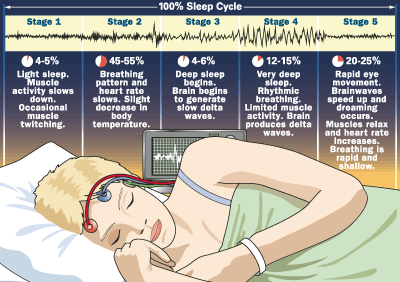CHAPTER 6: Sleep
IN THIS CHAPTER
1We spend nearly one-third of our lives asleep. Sleep is crucial for concentration, memory, coordination, and even emotional health. Without enough sleep, people have trouble focusing and responding quickly when they need to, such as when they’re behind the wheel of a car. In fact, sleep loss can have as great an effect on performance as drinking alcohol. And growing evidence suggests that a lack of sleep increases the risk of a variety of health problems, including diabetes, cardiovascular disease and heart attacks, stroke, depression, high blood pressure, obesity, and infections.
2Although much research has been done on sleep, it remains one of the great mysteries of modern neuroscience. Over the past few years, however, researchers have made tremendous headway in understanding some of the brain circuitry that controls wake-sleep states.
3Scientists now recognize that sleep consists of several different stages. What’s more, the choreography of a night’s sleep involves the interplay of these stages, a process that depends on a complex switching mechanism between sleep-wake states. Sleep stages are accompanied by daily rhythms in hormones, body temperature, and other functions.
4There are pressing reasons why understanding the mechanisms behind sleep is so important. Sleep disorders are among the nation’s most common health problems, affecting up to 70 million people, most of whom are undiagnosed and untreated. These disorders are one of the least recognized sources of disease, disability, and even death, costing an estimated $15.9 billion annually. Research holds promise for devising new treatments to allow millions of people to get a good night’s sleep.
